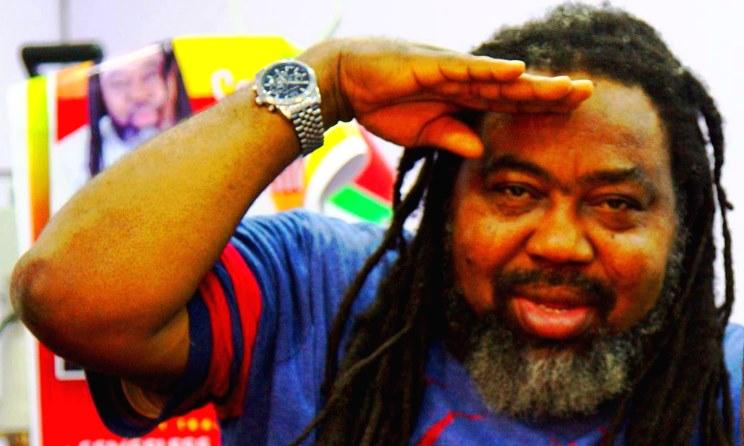Majek Fashek, Tony Okoroji, Orits Wiliki and others have said that the late reggae artist, Ras Kimono, has continued to live in the minds of his fans.
The musicians said this at the Copyright Society of Nigeria (COSON) tribute night in honour of the late rub-a-dub reggae artiste, who died on June 12.
They said Kimono had continued to live through the great messages he preached through his songs while on earth.
Majek Fashek, a veteran reggae artist, said: “Rastas don’t die but live on forever; therefore, Kimono is not dead but remains alive through his works.
“I will still see Kimono again but not here on earth but in heaven,” Fashek said.
Tony Okoroji, Chairman of COSON, said that Kimono was a fantastic musician who was completely de-tribalised and wanted the best for everybody.
“What makes a great artiste is the ability to compose music that touches the hearts and lives on forever.
“Kimono did not care where you came from, what religion you were practicing or which political party you belonged to.
“Kimono simply cared for justice. Kimono remained by my side throughout the COSON struggle and he contributed toward our achieving some of our feats,” Okoroji said.
Another musician, Sunny Neji, said that Kimono was like a fire brand that changed the entire reggae scene in Nigeria.
“Kimono stood for something because he was not only making music but addressing important societal issues by his songs.
“His music was a conscious one because everything he sang about and stood against then, is still happening today in our society.
“That is why his music will remain relevant forever. The younger generation of artistes should listen to Kimono’s music and learn a whole lot from them,” Neji said.
Also speaking, Buchi Atuonwu, a reggae gospel artist, said that Kimono was a pacesetter, a prophet, a freedom fighter and a jolly good-fellow full of love.
“It is our responsibility to reflect these characters by expressing his conscious messages in our lifestyles and be more loving toward one another,” Atuonwu said.
Orits Wiliki, another veteran reggae musician, said that it was time musicians paid more attention to their health by visiting the hospital regularly for medical checkups.
Meanwhile, a former Presidential Special Adviser, Sen. Florence Ita-Giwa, said that Kimono’s demise was untimely.
She said that it happened at a time when the organisers of the annual Calabar Carnival was planning to invite him to the festival.
Ita-Giwa, however, said that all hope was not lost because the invitation would be extended to his first daughter, Oge Kimono, who is also a musician.
Majek Fashek, Tony Okoroji, Orits Wiliki and others have said that the late reggae artist, Ras Kimono, has continued to live in the minds of his fans.
The musicians said this at the Copyright Society of Nigeria (COSON) tribute night in honour of the late rub-a-dub reggae artiste, who died on June 12.
They said Kimono had continued to live through the great messages he preached through his songs while on earth.
Majek Fashek, a veteran reggae artist, said: “Rastas don’t die but live on forever; therefore, Kimono is not dead but remains alive through his works.
“I will still see Kimono again but not here on earth but in heaven,” Fashek said.
Tony Okoroji, Chairman of COSON, said that Kimono was a fantastic musician who was completely de-tribalised and wanted the best for everybody.
“What makes a great artiste is the ability to compose music that touches the hearts and lives on forever.
“Kimono did not care where you came from, what religion you were practicing or which political party you belonged to.
“Kimono simply cared for justice. Kimono remained by my side throughout the COSON struggle and he contributed toward our achieving some of our feats,” Okoroji said.
Another musician, Sunny Neji, said that Kimono was like a fire brand that changed the entire reggae scene in Nigeria.
“Kimono stood for something because he was not only making music but addressing important societal issues by his songs.
“His music was a conscious one because everything he sang about and stood against then, is still happening today in our society.
“That is why his music will remain relevant forever. The younger generation of artistes should listen to Kimono’s music and learn a whole lot from them,” Neji said.
Also speaking, Buchi Atuonwu, a reggae gospel artist, said that Kimono was a pacesetter, a prophet, a freedom fighter and a jolly good-fellow full of love.
“It is our responsibility to reflect these characters by expressing his conscious messages in our lifestyles and be more loving toward one another,” Atuonwu said.
Orits Wiliki, another veteran reggae musician, said that it was time musicians paid more attention to their health by visiting the hospital regularly for medical checkups.
Meanwhile, a former Presidential Special Adviser, Sen. Florence Ita-Giwa, said that Kimono’s demise was untimely.
She said that it happened at a time when the organisers of the annual Calabar Carnival was planning to invite him to the festival.
Ita-Giwa, however, said that all hope was not lost because the invitation would be extended to his first daughter, Oge Kimono, who is also a musician.
Majek Fashek, Tony Okoroji, Orits Wiliki and others have said that the late reggae artist, Ras Kimono, has continued to live in the minds of his fans.
The musicians said this at the Copyright Society of Nigeria (COSON) tribute night in honour of the late rub-a-dub reggae artiste, who died on June 12.
They said Kimono had continued to live through the great messages he preached through his songs while on earth.
Majek Fashek, a veteran reggae artist, said: “Rastas don’t die but live on forever; therefore, Kimono is not dead but remains alive through his works.
“I will still see Kimono again but not here on earth but in heaven,” Fashek said.
Tony Okoroji, Chairman of COSON, said that Kimono was a fantastic musician who was completely de-tribalised and wanted the best for everybody.
“What makes a great artiste is the ability to compose music that touches the hearts and lives on forever.
“Kimono did not care where you came from, what religion you were practicing or which political party you belonged to.
“Kimono simply cared for justice. Kimono remained by my side throughout the COSON struggle and he contributed toward our achieving some of our feats,” Okoroji said.
Another musician, Sunny Neji, said that Kimono was like a fire brand that changed the entire reggae scene in Nigeria.
“Kimono stood for something because he was not only making music but addressing important societal issues by his songs.
“His music was a conscious one because everything he sang about and stood against then, is still happening today in our society.
“That is why his music will remain relevant forever. The younger generation of artistes should listen to Kimono’s music and learn a whole lot from them,” Neji said.
Also speaking, Buchi Atuonwu, a reggae gospel artist, said that Kimono was a pacesetter, a prophet, a freedom fighter and a jolly good-fellow full of love.
“It is our responsibility to reflect these characters by expressing his conscious messages in our lifestyles and be more loving toward one another,” Atuonwu said.
Orits Wiliki, another veteran reggae musician, said that it was time musicians paid more attention to their health by visiting the hospital regularly for medical checkups.
Meanwhile, a former Presidential Special Adviser, Sen. Florence Ita-Giwa, said that Kimono’s demise was untimely.
She said that it happened at a time when the organisers of the annual Calabar Carnival was planning to invite him to the festival.
Ita-Giwa, however, said that all hope was not lost because the invitation would be extended to his first daughter, Oge Kimono, who is also a musician.
Majek Fashek, Tony Okoroji, Orits Wiliki and others have said that the late reggae artist, Ras Kimono, has continued to live in the minds of his fans.
The musicians said this at the Copyright Society of Nigeria (COSON) tribute night in honour of the late rub-a-dub reggae artiste, who died on June 12.
They said Kimono had continued to live through the great messages he preached through his songs while on earth.
Majek Fashek, a veteran reggae artist, said: “Rastas don’t die but live on forever; therefore, Kimono is not dead but remains alive through his works.
“I will still see Kimono again but not here on earth but in heaven,” Fashek said.
Tony Okoroji, Chairman of COSON, said that Kimono was a fantastic musician who was completely de-tribalised and wanted the best for everybody.
“What makes a great artiste is the ability to compose music that touches the hearts and lives on forever.
“Kimono did not care where you came from, what religion you were practicing or which political party you belonged to.
“Kimono simply cared for justice. Kimono remained by my side throughout the COSON struggle and he contributed toward our achieving some of our feats,” Okoroji said.
Another musician, Sunny Neji, said that Kimono was like a fire brand that changed the entire reggae scene in Nigeria.
“Kimono stood for something because he was not only making music but addressing important societal issues by his songs.
“His music was a conscious one because everything he sang about and stood against then, is still happening today in our society.
“That is why his music will remain relevant forever. The younger generation of artistes should listen to Kimono’s music and learn a whole lot from them,” Neji said.
Also speaking, Buchi Atuonwu, a reggae gospel artist, said that Kimono was a pacesetter, a prophet, a freedom fighter and a jolly good-fellow full of love.
“It is our responsibility to reflect these characters by expressing his conscious messages in our lifestyles and be more loving toward one another,” Atuonwu said.
Orits Wiliki, another veteran reggae musician, said that it was time musicians paid more attention to their health by visiting the hospital regularly for medical checkups.
Meanwhile, a former Presidential Special Adviser, Sen. Florence Ita-Giwa, said that Kimono’s demise was untimely.
She said that it happened at a time when the organisers of the annual Calabar Carnival was planning to invite him to the festival.
Ita-Giwa, however, said that all hope was not lost because the invitation would be extended to his first daughter, Oge Kimono, who is also a musician.
Majek Fashek, Tony Okoroji, Orits Wiliki and others have said that the late reggae artist, Ras Kimono, has continued to live in the minds of his fans.
The musicians said this at the Copyright Society of Nigeria (COSON) tribute night in honour of the late rub-a-dub reggae artiste, who died on June 12.
They said Kimono had continued to live through the great messages he preached through his songs while on earth.
Majek Fashek, a veteran reggae artist, said: “Rastas don’t die but live on forever; therefore, Kimono is not dead but remains alive through his works.
“I will still see Kimono again but not here on earth but in heaven,” Fashek said.
Tony Okoroji, Chairman of COSON, said that Kimono was a fantastic musician who was completely de-tribalised and wanted the best for everybody.
“What makes a great artiste is the ability to compose music that touches the hearts and lives on forever.
“Kimono did not care where you came from, what religion you were practicing or which political party you belonged to.
“Kimono simply cared for justice. Kimono remained by my side throughout the COSON struggle and he contributed toward our achieving some of our feats,” Okoroji said.
Another musician, Sunny Neji, said that Kimono was like a fire brand that changed the entire reggae scene in Nigeria.
“Kimono stood for something because he was not only making music but addressing important societal issues by his songs.
“His music was a conscious one because everything he sang about and stood against then, is still happening today in our society.
“That is why his music will remain relevant forever. The younger generation of artistes should listen to Kimono’s music and learn a whole lot from them,” Neji said.
Also speaking, Buchi Atuonwu, a reggae gospel artist, said that Kimono was a pacesetter, a prophet, a freedom fighter and a jolly good-fellow full of love.
“It is our responsibility to reflect these characters by expressing his conscious messages in our lifestyles and be more loving toward one another,” Atuonwu said.
Orits Wiliki, another veteran reggae musician, said that it was time musicians paid more attention to their health by visiting the hospital regularly for medical checkups.
Meanwhile, a former Presidential Special Adviser, Sen. Florence Ita-Giwa, said that Kimono’s demise was untimely.
She said that it happened at a time when the organisers of the annual Calabar Carnival was planning to invite him to the festival.
Ita-Giwa, however, said that all hope was not lost because the invitation would be extended to his first daughter, Oge Kimono, who is also a musician.
Majek Fashek, Tony Okoroji, Orits Wiliki and others have said that the late reggae artist, Ras Kimono, has continued to live in the minds of his fans.
The musicians said this at the Copyright Society of Nigeria (COSON) tribute night in honour of the late rub-a-dub reggae artiste, who died on June 12.
They said Kimono had continued to live through the great messages he preached through his songs while on earth.
Majek Fashek, a veteran reggae artist, said: “Rastas don’t die but live on forever; therefore, Kimono is not dead but remains alive through his works.
“I will still see Kimono again but not here on earth but in heaven,” Fashek said.
Tony Okoroji, Chairman of COSON, said that Kimono was a fantastic musician who was completely de-tribalised and wanted the best for everybody.
“What makes a great artiste is the ability to compose music that touches the hearts and lives on forever.
“Kimono did not care where you came from, what religion you were practicing or which political party you belonged to.
“Kimono simply cared for justice. Kimono remained by my side throughout the COSON struggle and he contributed toward our achieving some of our feats,” Okoroji said.
Another musician, Sunny Neji, said that Kimono was like a fire brand that changed the entire reggae scene in Nigeria.
“Kimono stood for something because he was not only making music but addressing important societal issues by his songs.
“His music was a conscious one because everything he sang about and stood against then, is still happening today in our society.
“That is why his music will remain relevant forever. The younger generation of artistes should listen to Kimono’s music and learn a whole lot from them,” Neji said.
Also speaking, Buchi Atuonwu, a reggae gospel artist, said that Kimono was a pacesetter, a prophet, a freedom fighter and a jolly good-fellow full of love.
“It is our responsibility to reflect these characters by expressing his conscious messages in our lifestyles and be more loving toward one another,” Atuonwu said.
Orits Wiliki, another veteran reggae musician, said that it was time musicians paid more attention to their health by visiting the hospital regularly for medical checkups.
Meanwhile, a former Presidential Special Adviser, Sen. Florence Ita-Giwa, said that Kimono’s demise was untimely.
She said that it happened at a time when the organisers of the annual Calabar Carnival was planning to invite him to the festival.
Ita-Giwa, however, said that all hope was not lost because the invitation would be extended to his first daughter, Oge Kimono, who is also a musician.
Majek Fashek, Tony Okoroji, Orits Wiliki and others have said that the late reggae artist, Ras Kimono, has continued to live in the minds of his fans.
The musicians said this at the Copyright Society of Nigeria (COSON) tribute night in honour of the late rub-a-dub reggae artiste, who died on June 12.
They said Kimono had continued to live through the great messages he preached through his songs while on earth.
Majek Fashek, a veteran reggae artist, said: “Rastas don’t die but live on forever; therefore, Kimono is not dead but remains alive through his works.
“I will still see Kimono again but not here on earth but in heaven,” Fashek said.
Tony Okoroji, Chairman of COSON, said that Kimono was a fantastic musician who was completely de-tribalised and wanted the best for everybody.
“What makes a great artiste is the ability to compose music that touches the hearts and lives on forever.
“Kimono did not care where you came from, what religion you were practicing or which political party you belonged to.
“Kimono simply cared for justice. Kimono remained by my side throughout the COSON struggle and he contributed toward our achieving some of our feats,” Okoroji said.
Another musician, Sunny Neji, said that Kimono was like a fire brand that changed the entire reggae scene in Nigeria.
“Kimono stood for something because he was not only making music but addressing important societal issues by his songs.
“His music was a conscious one because everything he sang about and stood against then, is still happening today in our society.
“That is why his music will remain relevant forever. The younger generation of artistes should listen to Kimono’s music and learn a whole lot from them,” Neji said.
Also speaking, Buchi Atuonwu, a reggae gospel artist, said that Kimono was a pacesetter, a prophet, a freedom fighter and a jolly good-fellow full of love.
“It is our responsibility to reflect these characters by expressing his conscious messages in our lifestyles and be more loving toward one another,” Atuonwu said.
Orits Wiliki, another veteran reggae musician, said that it was time musicians paid more attention to their health by visiting the hospital regularly for medical checkups.
Meanwhile, a former Presidential Special Adviser, Sen. Florence Ita-Giwa, said that Kimono’s demise was untimely.
She said that it happened at a time when the organisers of the annual Calabar Carnival was planning to invite him to the festival.
Ita-Giwa, however, said that all hope was not lost because the invitation would be extended to his first daughter, Oge Kimono, who is also a musician.
Majek Fashek, Tony Okoroji, Orits Wiliki and others have said that the late reggae artist, Ras Kimono, has continued to live in the minds of his fans.
The musicians said this at the Copyright Society of Nigeria (COSON) tribute night in honour of the late rub-a-dub reggae artiste, who died on June 12.
They said Kimono had continued to live through the great messages he preached through his songs while on earth.
Majek Fashek, a veteran reggae artist, said: “Rastas don’t die but live on forever; therefore, Kimono is not dead but remains alive through his works.
“I will still see Kimono again but not here on earth but in heaven,” Fashek said.
Tony Okoroji, Chairman of COSON, said that Kimono was a fantastic musician who was completely de-tribalised and wanted the best for everybody.
“What makes a great artiste is the ability to compose music that touches the hearts and lives on forever.
“Kimono did not care where you came from, what religion you were practicing or which political party you belonged to.
“Kimono simply cared for justice. Kimono remained by my side throughout the COSON struggle and he contributed toward our achieving some of our feats,” Okoroji said.
Another musician, Sunny Neji, said that Kimono was like a fire brand that changed the entire reggae scene in Nigeria.
“Kimono stood for something because he was not only making music but addressing important societal issues by his songs.
“His music was a conscious one because everything he sang about and stood against then, is still happening today in our society.
“That is why his music will remain relevant forever. The younger generation of artistes should listen to Kimono’s music and learn a whole lot from them,” Neji said.
Also speaking, Buchi Atuonwu, a reggae gospel artist, said that Kimono was a pacesetter, a prophet, a freedom fighter and a jolly good-fellow full of love.
“It is our responsibility to reflect these characters by expressing his conscious messages in our lifestyles and be more loving toward one another,” Atuonwu said.
Orits Wiliki, another veteran reggae musician, said that it was time musicians paid more attention to their health by visiting the hospital regularly for medical checkups.
Meanwhile, a former Presidential Special Adviser, Sen. Florence Ita-Giwa, said that Kimono’s demise was untimely.
She said that it happened at a time when the organisers of the annual Calabar Carnival was planning to invite him to the festival.
Ita-Giwa, however, said that all hope was not lost because the invitation would be extended to his first daughter, Oge Kimono, who is also a musician.













